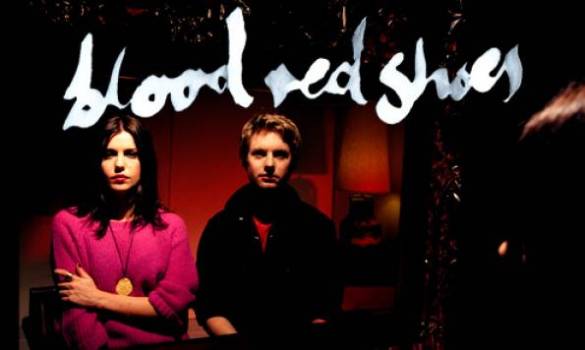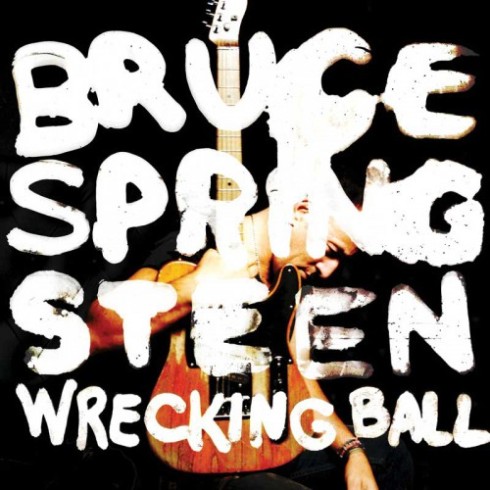Blood Red Shoes – In Time To Voices
I went and got drunk for no reason at all tonight. Shall we begin?
“In Time To Voices” is the third release from indie/pop duo Blood Red Shoes, an alt. rock duo from Brighton who have been plugging away at the British alternative scene since the early 21st Century. They finally made their mark on the genre in the decade I must agonizingly refer to as the “teenies” for want of someone cleverer making up a more poignant name, but as it stands, that is the decade they did it in. No, my generation, I don’t like it either. Yes, of course it sounds stupid. No, a petition won’t work. Look, can we get on with the review or not? Yes? Okay? Okay? Thank you.
The album starts in a dramatic and “epic” style, with echoing guitars and slow, building, pounding drums. The vocals, executed by Laura-Mary Carter are reminiscent of the early Yeah Yeah Yeahs, with a mixture of droning and warbling intermixing pleasingly on the (opening) title track. The guitar “solo”, if one can call it as such, is disappointing – a lament in the style of so many indie bands, relying on the vibrato of a single note for a four-bar duration; exactly the downfall of bands such as Bloc Party and The Big Pink, whose musical talents never fully matched their lyrical ones. Nevertheless, Blood Red Shoes overcome this small fault by building and building, rising above the foundations of the song in true opening style and ascending to a climax that leaves the listener – if not baying for more – at least curious and open to the remainder of the album.
Carter and Steve Ansell, the other half of the band, compliment each other’s vocals well, their two voices blending into an appreciable mix that gives the impression of one unified voice rather than several competing ones. “Lost Kids” is the followup track to “In Time To Voices”, but it in many ways is an identical song, following a similar structure and tempo to its preceding song and providing nothing new with which to capture the fresh listener. It is perhaps my critical nature towards indie and alternative bands of the 2010s, but they seem far more content in rehashing their own, time-told styles than adventuring into the great unknown and trailblazing new ones.
“Cold” is the first strong track on the album, showcasing both Carter’s ice-like, Patti-Smith howl and Ansell’s classic indie bark, which provides the substructure of the song and allows him to truly growl for the first time in seven minutes. Despite its catchy, anthemic chorus, the song reeks of the indie/pop genre that stagnated slightly towards the end of the last decade, and its approach is nothing new to anyone who has ever heard the aforementioned Yeah Yeah Yeahs or, to grope back into the mists, the Pixies, even.
When it comes to slower compositions, BRS have more success. “The Silence and the Drones” begins simply with Carter’s harmonic vocals and a solitary drumbeat, which creates a haunting, atmospheric tone that is truly invigorating and intriguing; a song that you’ve, again, heard a thousand times before but not in this way. It builds to a crescendo – not an uncommon fallback in alternative music – but the drum track is not overpowering, and the track gives a sense of melancholy more than an “epic” set of bass notes, and is note merely manufactured into a marketable indie/pop song.
Another reviewer recently described Blood Red Shoes as an alternative to repetitive indie churn-out music – an evaluation I wholeheartedly disagree with. While they are not, in totality, a carbon copy of any current or past indie/alternative set-ups, BRS provide no new vision to the alternative scene, instead insisting on rehashing Karen-O soundalikes to the tune of ghostly guitars and faded Toms.
Are there no pimples on the skin; no stand-out mountains on a plain grassland of an album? Certainly not: Je Me Perd, French for “I Am Lost” is a welcome change of pace and tone, reminiscent of the grunge of the 90s and providing a brief, sheer moment of excitement on an otherwise reserved album. “Stop Kicking”, similarly, is a showcase of Ansell’s, rather than Carter’s, singing talents, and they prove to be much more enjoyable lyrically – or perhaps put to a more receptive song. This is the key thought when entertaining the genetic make-up of BRS – whether one member has been given weaker songs, and one stronger, or whether one if the more obviously talented writer and has taken their songs for themselves.
The album in all is not a disappointing affair – merely a predictable one. Alternative music, at least towards the “indie” side of it, has entered a stagnation from which it does not seem to be recovering. Bands like Bloc Party, which forged their own sword, as it were, in the late Noughties, are being more heavily relied on than ever in the creation of new alternative music on the British scene. Blood Red Shoes’ release provides excellent filler music, but unfortunately is an album entirely composed as such; with nothing particularly capturing the musical or lyrical imagination from start to finish.
It is a shame, due to the obvious musical talents of both parties involved, but the hymn-like attitude with which the material is approached has at least stricken me with a desire not to listen for the second time. In my eyes, at least, the “alternative indie” genre is dying along with the bands that procured it – the YYYs having not released anything since It’s Blitz, and BP having disbanded – and sooner or later, the style will have to go too. BRS have merely failed to evolve with the times, and must lie with the fossils that they worship.



